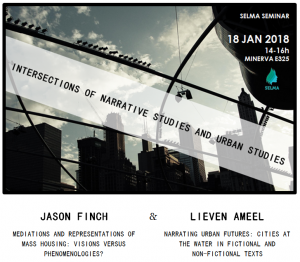Speaking today at the conference “Nineteenth Century Studies and Visions of the Future” (Helsinki, 26.1.2018) on one of my favorite books – the little known utopian novel Sybaris and other homes by Edward E. Hale. I wrote at length about its utopian features in my 2016 article “Cities Utopian, Dystopian and Apocalyptic” (Palgrave Handbook of Literature and the City) – today I’ll speak specifically about the ways in which it frames urban and environmental justice.

Abstract:
Towards a Future in Balance: Utopian Visions of Urban and Environmental Justice in Edward E. Hale’s Sybaris and Other Homes (1869)
Lieven Ameel
In the little-known utopian text “My Visit to Sybaris”, in Edward E. Hale’s Sybaris and Other Homes (1869), the protagonist finds himself unexpectedly in an Italian-Greek city preserved from antiquity, whose inhabitants combine highly developed technology with ancient legal practices. The text’s concerns range from the problematics of urban housing and financial reform to urban and suburban planning. A particularly intriguing concept is that of “harpagmos”, a verdict passed for a crime when someone “has taken from a citizen what he cannot restore” (Hale 52). The crime includes the stealing of time, echoing contemporary discussions about labour and currency reform. There are interesting ecological dimensions, too, since the verdict of “harpagmos” can be passed for disturbing the natural and ecological harmony. In this respect, “Sybaris” prefigures later utopian/dystopian accounts concerned with ecological catastrophes. In my presentation, I will examine “My Visit to Sybaris” in its context of nineteenth-century utopian literature, with a particular interest in the environmental undercurrents in the text. My approach is further informed by a concern with how the paratextual elements of the text, its various time frames, as well as the intertextual references (including numerous references to texts from Antiquity) point to particular readings of the text.


